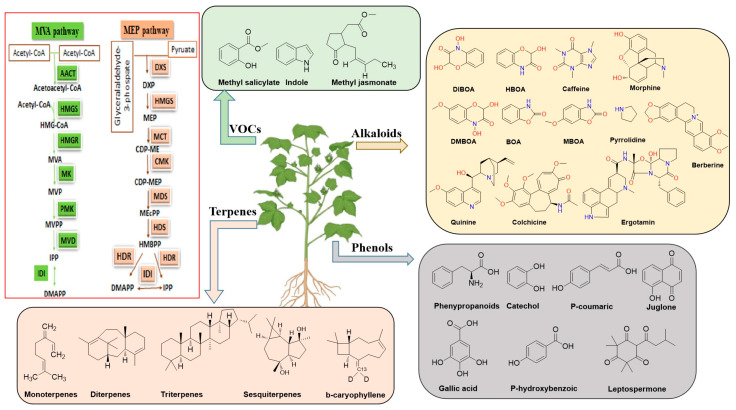Figure 1.
Secondary metabolites in invasive weeds, for the synthesis of isopentenyl diphosphate (IPP), dimethylallyl diphosphate (DMAPP), methylerythritol phosphate (MEP), and mevalonate (MVA) pathways responsible. Acetoacetyl-CoA, 3-hydroxy-3-methylglutaryl-CoA (HMG-CoA), acetyl-CoA, acetoacetyl-CoA, acetyl-CoA, MVA, 5-phosphomevalonate (MVP), and 5-diphosphomevalonate (MVPP) are the intermediaries of the MVA pathway. Acetyl-CoA acetyltransferase (AACT), 3-hydroxy-3-methylglutaryl-CoA synthase (HMGS), mevalonate kinase (MK), 3-hydroxy-3-methyl-glutaryl-CoA reductase (HMGR), phosphomevalonate kinase (PMK), diphosphomevalonate decarboxylase (MVD), and isopentenyl diphosphate isomerase (IDI) are the enzymes involved in the MVA pathway. Relatively to the MEP pathway, its intermediaries are D-glyceraldehyde 3-phosphate (G3P), pyruvate, 1-deoxy-d-xylulose 5-phosphate (DXP), MEP, 4-(cytidine 5′-diphospho)-2-C-methyl-D-erythritol (CDP-ME), 2-phospho-4-(cytidine 5′-diphospho)-2-C-methyl-D-erythritol (CDP-MEP), 2-C-methyl-D-erythritol-2,4-cyclodiphosphate (MEcPP), and 1-hydroxy-2-methyl-2-butenyl 4-diphosphate (HMBPP). The enzymes involved in the MEP pathway are 1-deoxy-d-xylulose-5-phosphate synthase (DXS), 1-deoxy-d-xylulose-5-phosphate reductoisomerase (DXR), 2-C-methyl-D-erythritol 4-phosphate cytidylyltransferase (MCT), 4-diphosphocyt-idyl-2-C-methyl-D-erythritol kinase (CMK), 2-C-methyl-D-erythritol 2,4-cyclodi-phosphate synthase (MDS), 4-hydroxy-3-methylbut-2-enyl-diphosphate synthase (HDS), and 4-hydroxy-3-methylbut-2-enyl diphosphate reductase (HDR).

